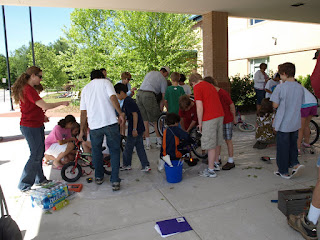JOE ISRAEL
Joe Israel was one of the first bike recipients in the Bikes for Education program in Baclayon, on the island of Bohol, Philippines. Through this program students were identified and interviewed by local Bikes for the World partner, Bikes for the Philippines (BfP). The bikes are intended to help students living over 3km from school to stay enrolled in class by loaning them a faster, safer means of transportation.
The drop out rate in Baclayon, like many other communities in the Philippines, is in danger of rising due to the location of the schools in relation to the students' homes. In the village of Baclayon there are many primary schools but only one high school. Therefore, even if a student lives relatively close to school chances are once they enter high school they may not. Two of the critical areas forcing students to drop out are household income and distance from school. Many of the students are an integral part of the household, completing essential chores or helping to care for younger siblings, and the time spent walking to school (sometimes over 4 hours a day) becomes too big a burden on many families. That is why these two factors played a big part in who was chosen by BfP to receive a bicycle.
 |
| Joe mentors younger girls in mechanics |
Just learning to ride offered a new sense of confidence to these beneficiaries. The local bike club joined the students on Saturdays and took them on community rides providing a unique mentoring program to the older students. Once the kids became more skilled they in turn mentored the younger students who received their bikes later. The donation process was staggered to allow for this students-training-students model.
| The Boys of Baclayon |
On one of the rides, one student fell coming down a steep hill. All of the boys we were riding with stopped, organized, and made sure she was taken care of properly. Some of the boys went and got help (she was pretty shaken up but not seriously injured) and the others stayed with Michelle holding and supporting her until help came. I was very touched by their sensitivity and maturity. The camaraderie our donated bikes brought this group of students was beyond inspirational.
 |
| Joe received training at The Rock a local bakery |
The community has recognized the impact this bike program has on the entire village. In fact, several local businesses stepped up to offer internships to graduating beneficiaries. Joe went on to receive training at Rock111 a local bakery learning the basics of running a bakery business. He joined several other bike beneficiaries including Joan Igcas in this life sculpting opportunity.










